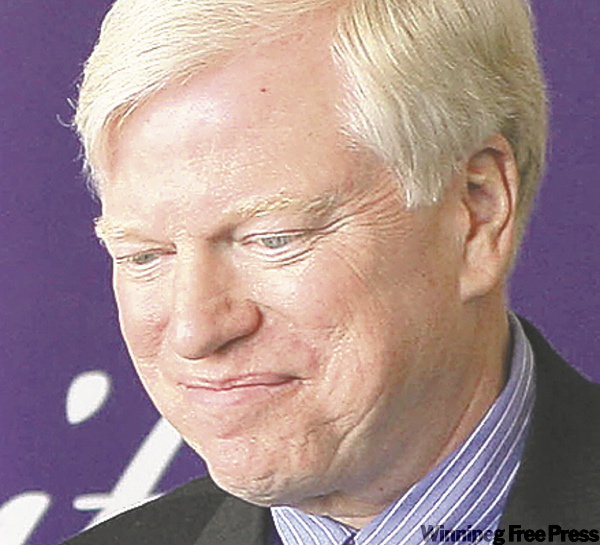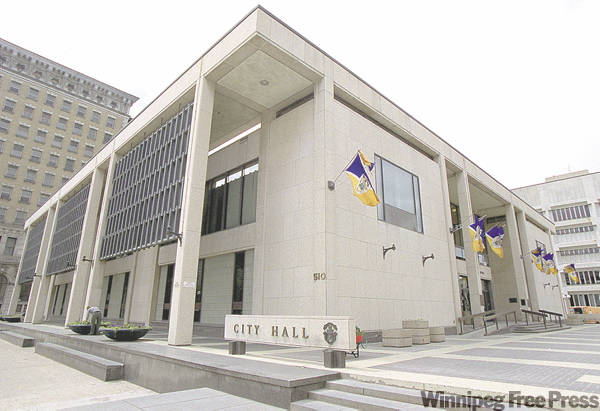Power struggles at city hall?
Apparent rift between councillors, civil servants
Advertisement
Read this article for free:
or
Already have an account? Log in here »
To continue reading, please subscribe:
Monthly Digital Subscription
$0 for the first 4 weeks*
- Enjoy unlimited reading on winnipegfreepress.com
- Read the E-Edition, our digital replica newspaper
- Access News Break, our award-winning app
- Play interactive puzzles
*No charge for 4 weeks then price increases to the regular rate of $19.00 plus GST every four weeks. Offer available to new and qualified returning subscribers only. Cancel any time.
Monthly Digital Subscription
$4.75/week*
- Enjoy unlimited reading on winnipegfreepress.com
- Read the E-Edition, our digital replica newspaper
- Access News Break, our award-winning app
- Play interactive puzzles
*Billed as $19 plus GST every four weeks. Cancel any time.
To continue reading, please subscribe:
Add Free Press access to your Brandon Sun subscription for only an additional
$1 for the first 4 weeks*
*Your next subscription payment will increase by $1.00 and you will be charged $16.99 plus GST for four weeks. After four weeks, your payment will increase to $23.99 plus GST every four weeks.
Read unlimited articles for free today:
or
Already have an account? Log in here »
Hey there, time traveller!
This article was published 05/10/2009 (5885 days ago), so information in it may no longer be current.
A plan to change the way garbage is collected in Winnipeg gets made public only a week before a city council vote.
A complex proposal to create a new water-and-waste utility is changed on the fly after city officials have trouble explaining details to politicians and the public.
An otherwise simple report about a Fort Garry land swap surprises both residents and councillors by proposing a massive new housing development, a freeway extension and rapid-transit spur line — again, only days before a council vote.

The shaky rollout of three initiatives at city hall over the past three months has left a growing number of councillors complaining about being left in the dark over the plans being made by their non-elected civil service counterparts.
And it’s illuminated a rift at city hall that’s being characterized as either a simple communication gap — or an outright power struggle between politicians and bureaucrats.
"I am worried a gap between administration and council is developing," said St. Vital Coun. Gord Steeves, the only member of council who voted against changes at city hall that appear to lie at the root of the behind-the-scenes conflict.
The supposed rift dates back to the summer of 2008, when Glen Laubenstein, several months into his job as Winnipeg’s chief administrative officer, began reorganizing the city’s 8,200-strong workforce.
Laubenstein’s plan was to "break down silos" between departments and eliminate the bunker mentality that can exist in individual city offices.
When the reorganization was approved by city council in September 2008, two high-level city departments — EPC Secretariat and CAO Secretariat — were dissolved, and the policy analysts who worked in those offices were either moved into other city jobs or left the civil service altogether.
Three new deputy chief administrative officers — Phil Sheegl, Alex Robinson and chief financial officer Mike Ruta — were appointed to assist Laubenstein. And the city clerk, who oversees the legislative process at city hall, was told to report directly to the CAO instead of city council.
The reorganization was approved 14-1, with only Steeves voting against it. One year later, no less than seven other councillors are complaining about the reorganization, either because they feel the city doesn’t have enough policy experts to oversee important initiatives or because the lines between politicians and bureaucrats are unclear.
The unsatisfied councillors run the gamut from rookie River Heights Coun. John Orlikow — who stood on the floor of council last week to complain bitterly about knowing little about the garbage plan — to Mynarski Coun. Harry Lazarenko, who was first elected to council in 1974.
"The way it’s structured now, there seems to be a lack of communication. You have so many administrators and the deputies for the chief administrator. You have people running around doing things without us even knowing about it," Lazarenko said.
"We used to have (policy) people who formed a liaison between the politicians and the administrators. They weren’t always popular, as a lot of councillors felt the role they played was getting information before they did," added Steeves, referring to EPC Secretariat.

"I never saw it that way. I saw them as a valuable way of providing political oversight. Without them, I don’t understand how that can happen."
The absence of policy people is not limited to Winnipeg’s civil service. Mayor Sam Katz has also allowed the number of policy experts in his office to dwindle due to attrition. The mayor now has a single political adviser, policy director Krista Boryskavich, and no longer even employs a chief of staff.
Even Katz’s critics argue he needs more help.
"What we have right now isn’t working, because there’s a grey area between the political side and the administration," said Fort Rouge Coun. Jenny Gerbasi, adding she regrets voting for the reorganization. "We were promised we wouldn’t have these problems any more, but the lines between political and administrative staff are unclear."
Steeves said the end result is more power has been placed in Laubenstein’s office, suggesting a pendulum is swinging back from council to the administration building for the first time since the 1990s, when former Mayor Susan Thompson eliminated the board of commissioners.
Laubenstein, however, said Steeves isn’t seeing the big picture. The intention of the reorganization he launched is to break down the walls between departments, eliminate hierarchical structures that stifle creativity and ultimately create a more flexible and effective workforce, he said.
"We’re not trying to take power. We’re trying to give it away," said Laubenstein. "If (this is) about giving power to me and the deputies, they’ve missed the message."
No other major city in Canada had a policy office like EPC Secretariat, and CAO Secretariat simply had too many employees, Laubenstein added, noting former employees of the defunct departments now serve important roles elsewhere within the city.
But Laubenstein said he does see the value in Katz hiring more policy experts to work in the mayor’s office, especially given the major initiatives facing the city, such as a new long-term planning blueprint and rapid transit.
"Do we need more people on the political side working for the mayor and EPC and the whole of council by extension? I would probably say yes," Laubenstein said.
The mayor, however, said he doesn’t want any new advisers, but he conceded committee chairmen such as Steeves could use some help on major files.

Katz insists none of the problems that have beset city hall over the past three months has had anything to do with the reorganization. Reports came out of nowhere when Glen Murray was Winnipeg’s mayor, the current mayor noted.
"Need, I remind you, MTS Centre was walked on to the floor of council," Katz said. "Things like that should never happen. Nobody likes surprises."
bartley.kives@freepress.mb.ca
City hall brain drain?
A selected list of policy experts and advisers who’ve switched jobs or left the City of Winnipeg since 2008:
Sherwood Armbruster: Mayor Sam Katz’s former chief of staff. Quit to work for Siloam Mission in July and has not been replaced.
Terry Aseltine: Longtime communications officer in since-disbanded CAO Secretariat. Left for University of Manitoba before position was eliminated as part of city reorganization.
Krista Boryskavich: Former No. 2 person at EPC Secretariat, city hall’s defunct policy office. Now Katz’s policy director.
Bryan Gray: Former head of EPC Secretariat. Now one of three senior staffers putting together new water-and-waste utility.

Brian Kelcey: Former special adviser to Katz on economic issues. Quit in the middle of operating budget discussions in 2008.
Sara MacArthur: Used to handle environmental files for EPC Secretariat. Now Red River College’s sustainability manager.
Caroline Neufeld: Used to handle First Nations and cultural files for EPC Secretariat. Quit in 2008 and now working in Vancouver.
Alex Robinson: Former adviser in EPC Secretariat and acting CAO. Now one of three deputy chief administrative officers.
Alec Stuart: Former environmental co-ordinator in CAO Secretariat. Now with Manitoba Hydro.
Pam Sveinson: Outgoing chief communications officer for Winnipeg. Moving into planning, property and development to work in permits division.
Connie Walker: Former long-term planner in CAO Secretariat. Now with the United Way.
Where the power lies
People with the knowledge and the ability to effect policy at city hall:

Mayor: Winnipeg’s most powerful official, Sam Katz effectively directs city policy through his role as the chair of executive policy committee, whose members he appoints. Can also count on nine other votes in Winnipeg’s 16-member council, which means he rarely loses important decisions.
Executive policy committee: The six members of Katz’s inner circle typically learn about city hall initiatives before other councillors. Five of them chair standing committees and can ask city staff to study specific policies.
Non-EPC councillors: Nine other members of council can sit in on closed-door meetings but do not get as much advance warning as EPC members.
Chief administrative officer: Glen Laubenstein runs Winnipeg’s 8,200-member workforce and is expected to implement policy directives. Katz has given Laubenstein more latitude than former city CAO Annitta Stenning enjoyed.
Deputy CAOs: Phil Sheegl and Alex Robinson are considered quasi-political by some councillors because they provide policy oversight yet work in the administration building. A third deputy, Mike Ruta, is Winnipeg’s chief financial officer.
Department directors: The chief of police, fire-paramedic chief and other department directors are expected to both implement directives and come up with ideas of their own.
City clerk: Completely apolitical, Richard Kachur oversees the legislative process at city hall. He used to report to the mayor and council, but has been placed under the aegis of the CAO since the 2008 city reorganization.


